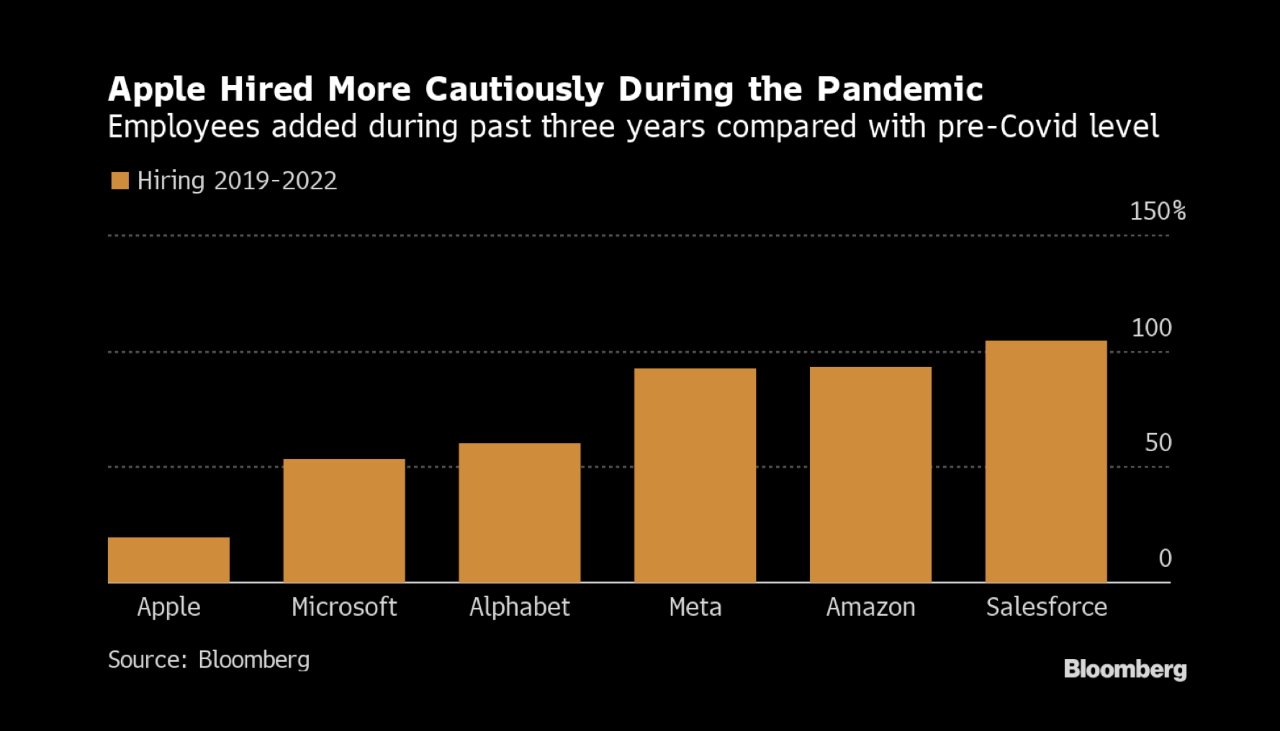How Apple avoided Big Tech's mass layoffs
Apple has not had to make thousands of employees redundant because it was careful not to hire too many over the pandemic -- and new figures show just how careful it was.

Tim Cook has already said that Apple is being cautious in its recruitment following the pandemic and the downturn that's led to massive job cuts in Big Tech firms. What he hasn't mentioned is that Apple was also careful not to over-recruit when the pandemic was its worst.
According to new figures from Bloomberg, the number of Apple employees grew 20% between 2020 and 2022. That compares to a 60% increase at Alphabet, Google's parent company, and close to 100% at Amazon and Salesforce.
That isn't a near-doubling of employee numbers, but it is almost a doubling of how many new hires were added to the pre-COVID staffing levels.

Apple was already recruiting more cautiously throughout the pandemic (source: Bloomberg)
Meta, Facebook's parent, added approximately 90% more employees than before, while Microsoft took on just over 50% extra.
Apart from Apple, every one of these firms has subsequently had to lay off thousands of people. In Amazon's case, it cut 18,000 jobs, while both Google and Microsoft laid off over 10,000.
Of the major tech companies, only Apple and Alphabet increased their average revenue per employee. Alphabet's increase, though, was not statistically significant, where Apple more than doubled its revenue per person.
Apple is also shedding staff, but at a fraction of the numbers from other firms. In August 2022, it laid off 100 recruiters, for instance.
Read on AppleInsider

Tim Cook has already said that Apple is being cautious in its recruitment following the pandemic and the downturn that's led to massive job cuts in Big Tech firms. What he hasn't mentioned is that Apple was also careful not to over-recruit when the pandemic was its worst.
According to new figures from Bloomberg, the number of Apple employees grew 20% between 2020 and 2022. That compares to a 60% increase at Alphabet, Google's parent company, and close to 100% at Amazon and Salesforce.
That isn't a near-doubling of employee numbers, but it is almost a doubling of how many new hires were added to the pre-COVID staffing levels.

Apple was already recruiting more cautiously throughout the pandemic (source: Bloomberg)
Meta, Facebook's parent, added approximately 90% more employees than before, while Microsoft took on just over 50% extra.
Apart from Apple, every one of these firms has subsequently had to lay off thousands of people. In Amazon's case, it cut 18,000 jobs, while both Google and Microsoft laid off over 10,000.
Apple gets more from its staff
Bloomberg figures also estimate that Apple has generated much more revenue per additional employee during the pandemic years.Of the major tech companies, only Apple and Alphabet increased their average revenue per employee. Alphabet's increase, though, was not statistically significant, where Apple more than doubled its revenue per person.
Apple is also shedding staff, but at a fraction of the numbers from other firms. In August 2022, it laid off 100 recruiters, for instance.
Read on AppleInsider

Comments
And/or it could just be a result of a company that looks long term compared to those other companies that only see what profits can be made immediately, this quarter, out of the current situation. Apple has a history of taking the long view and seeing trends before they become obvious to everyone. Perhaps they, unlike Amazon and Alphabet, understood that the pandemic was a temporary glitch and more long term success would be assured by planning accordingly.
they do t get sloppy just because there is money to spare. Wise spending leads to minimal losses and healthy profits all the time.
Amazon was directly impacted and had literally no option but to massively expand its headcount, both in return/logistics and AWS.
As cloud activity ballooned, the big cloud players all had to expand operations to compensate.
Apple wasn't as exposed as the others and now the effects of the pandemic are adjusting back down (coupled with an economic downturn).
The economic downturn will affect Apple, though. YoY iPhone sales for the traditional blowout quarter at Apple are reportedly down 41% in Spain for example.
As people get back into old habits and Covid restrictions are lifted, things readjust. Throw in an economic downturn in many parts of the world in which people have less disposable income and companies, that had to expand to accommodate one situation, contract to accommodate another.